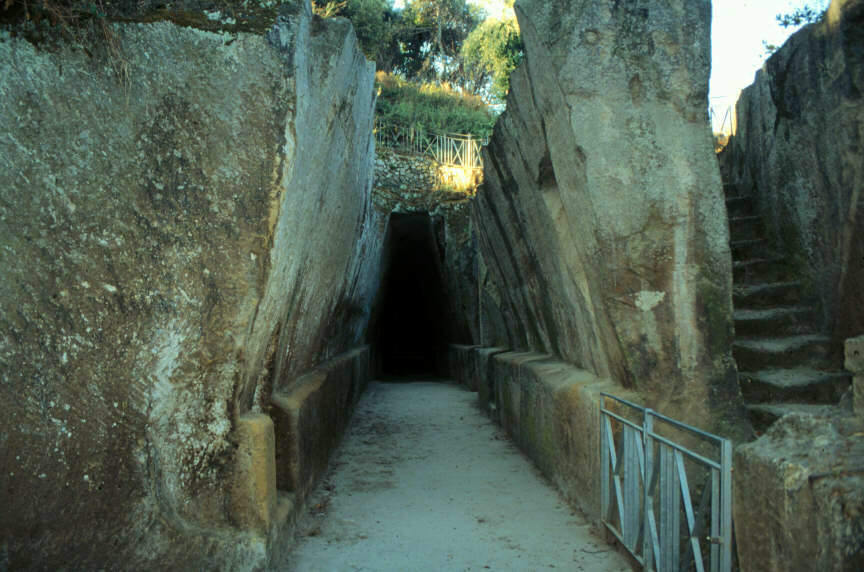Vergilian Society

Entrance to the
cave of the Sibyl
at Cumae
Aeneid Six and its Cultural Reception
The Harry Wilks Study Center at the Villa Vergiliana in Cumae, Italy
June 25-27 2013
Outside of the Bible, no text has had as profound an impact on Western Culture as the Aeneid,
and within the Aeneid, no book has been as influential as Aeneid Six. Ovid was perceptive enough
to recognize its profound novelty, when his Sibyl refers to Vergil's underworld as novissma regna
mundi (Met. 14.111). By the time of Servius the novissima regna had been arranged according various
intellectual disciplines such as historia, philosophia, and theology with numerous scholiasts commenting
on the many cruces posed by the text. The novelty and intellectual expansiveness of the Book allowed the text
to have a number of reincarnations and afterlives. As Aeneas moves through the underworld Vergil constructs a
literary space that has spawned countless literary and artistic responses. The ecphrastic program of the journey
offered to later generations a storehouse of images, which could be articulated in painting, relief and literature.
The philosophical and theological incorporation of Orphism, Pythagoreanism, Platonism, and Stoicism raises important
considerations about the ontology of the soul and the poetics of eschatology, which could be harnessed by Christian
Theologians for their own ends. The blurring of genres in Aeneid Six-of Epic, Tragedy, Comedy, Ethnography-along with
the movement from fabula to historia during Aeneas' journey inaugurated a new poetic aesthetic. It changed how cultures
evaluated and understood poetic inspiration. Its ambition and scope changed what literature was and what it would become.
Vergil responds to the entirety of Greek and Roman literary and intellectual achievement as he circumscribes it within
the domain of the Aeneid and in so doing he provides a roadmap for later artists, poets and thinkers to
achieve similar ends, but for different purposes. It is not an overstatement to suggest that Western
Culture and significant aspects of its development hinge and pivot along the literary, religious, and
philosophical lines of Aeneid Six.
The central problem of the text is how do researches confront the scale of this work and its various
iterations? It is a humble truth to recognize that Aeneid Six as an act of cultural reception is beyond the
knowledge and scholarly skill of a single individual. Its reception necessitates scholarly conversation and
investigation in an interdisciplinary and international context. From this perspective Aeneid Six is a perfect
test case for theoretical and practical applications of reception, and it allows scholars to think about the
underlying causes for the rise of reception studies over the last two decades. It is the primary aim of the
conference to come to a new understanding of reception as a process of continuity and change from the Classical
era to the present. How does conceiving of Aeneid Six as a product of reception as well as a catalyst for other
receptions illuminate receptions studies? How does Vergil channel the vast complex of prior literature, philosophy
and religion into his poem and how does this contribute to the meaning of the Aeneid? Does Vergil create a coherent
eschatology or does the polyphony of traditions result in contradictory stances? How do later thinkers and artists
respond to Vergil's artistic vision? How and why was Aeneid Six established as a central text for reception, and
just as importantly why has it been displaced within the last few generations?
Participants include: Alessandro Barchiesi (keynote speaker), Philip Hardie, Joseph Farrell, Alison Keith,
David Quint, Alessandro Schiesaro, Damien Nelis, Maggie Kilgour, Miguel Herrero, Renaud Gagné, and Sarah Spence.
Under the auspices of the Vergilian Society scholars and students are invited to submit abstracts
of 300-500 words on Aeneid Six and its reception. In particular, abstracts on following issues will be especially welcome:
*The reception of prior Greco-Roman art and thought.
*The meaning of Aeneid Six within Vergil's poetic output and its immediate impact on Roman literature and culture.
*Studies on the scholastic tradition from Servius to Norden.
*The reception of Aeneid Six from Late Antiquity to the Early Modern period.
*Papers on the place of Aeneid Six in religious, philosophical and intellectual history.
*Analyses of Aeneid Six in light of archaeological findings, material culture and art history.
*Discussions on the theoretical underpinnings which inform reception studies.
Papers should aim to be no more than 30 minutes in length.
Papers in languages other than English are more than welcome.
Abstracts should be submitted no later than November 30th 2012.
Notification of acceptance will follow soon after.
Please send abstracts as a PdF attachment to charles.gladhill@mcgill.ca.
Registration Form
Registration Payment by Credit Card
Return to home page

